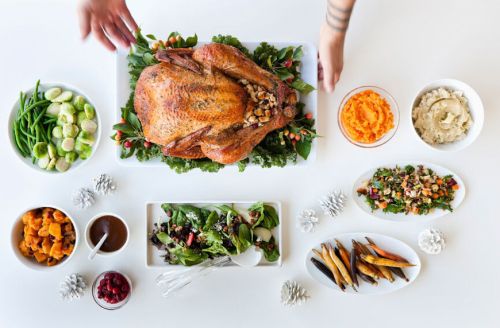7 digestion-saving tips to help you navigate Thanksgiving dinner like a gastroenterologist
The holidays always involve eating lots of rich food. A gastroenterologist reveals what helps indigestion and how to avoid it at Thanksgiving and beyond.

Yes, yes, Thanksgiving is about family time and gratitude. But let’s get real for a second: it’s mostly about eating all of the delicious things that are usually only served once a year, like pumpkin pie, stuffing, and green bean casserole.
The only downside to this glorious, food-first holiday? It’s fairly common to experience some…ahem, digestive distress or acid reflux after an evening filled with foods rich in fat and sugar.
Luckily, there are a few ways to keep your digestive tract happier, where you’re consuming smaller portions at once, taking breaks or eating earlier, and avoiding or limiting certain foods most likely to lead to poor digestion or symptoms of GERD/acid reflux post-meal. Here are a few great tips from Niket Sonpal, MD, an NYC internist and gastroenterologist, to help avoid indigestion on Turkey Day and beyond.
1. Cut back on the booze
You might love wine with turkey, and it’s fine to have some alcohol to enjoy the holiday, but be mindful of your intake. Alcohol can upset your stomach or cause a flare-up in acid reflux when consumed in excess, says Dr. Sonpal.
Some types of alcohol are worse than others for this, he adds. “Have to have that holiday egg nog? Limit it to one glass. This festive beverage can do double the damage,” he says. “Not only does it contain alcohol that irritates your stomach but it contains the added dose of diary that can cause bloating and gas,” he says—or just stick to a glass or two of wine instead.
2. Avoid clear heartburn triggers
That’s a no-brainer, particularly if you’re prone to heartburn. “Common [trigger] foods include chocolates, caffeine, and greasy foods. These foods relax the lower esophagus sphincter muscle. When this muscle is relaxed, the food will go back up and cause heartburn,” Dr. Sonpal says. “Other foods that can trigger heartburn include acidic foods, such as citrus fruits, or carbonated beverages. This means avoid Champagne,” he adds. (Sorry, doctor’s orders!)
3. Make room for salad
Dr. Sonpal recommends eating some salad first to fill up and get in some greens. “Salads are good news for those with chronic heartburn or GERD—if you have the right salad dressing and ingredients, that is,” he says. ‘High-fat foods are a known trigger for acid reflux, so the National Heartburn Alliance recommends avoiding creamy salad dressings, as well as oil and vinegar. Your best bet is a low-fat salad dressing, and avoid tomatoes, raw onions, and other acid-aggravating ingredients.” Build a good salad or eat whatever you can from the options at the table for a low-fat, healthy option that won’t overwhelm your digestive tract.
4. Add ginger to your food
“Ginger is one ingredient that can help ease heartburn, if you don’t get too much of it. More than two to four grams per day can actually cause heartburn,” he says. “Ginger is a natural match for root vegetable dishes commonly served during the holidays. Heartburn-friendly vegetables include carrots, cabbage, peas, broccoli, and green beans,” he says, so use it in preparation with these veggies. (Or just sneak some ginger candies into your bag for later.)
Ginger is great for so many other aspects of your health—here’s the lowdown:
5. Drink water
Stay hydrated and drink water while you’re eating the meal. “Sip water between bites of food. This will slow down your eating process,” Dr. Sonpal says, which can help reduce one’s risk of indigestion or heartburn. Plus, “drinking water aids digestion and the breakdown of foods in the stomach,” he adds. So, keep filling that glass up.
6. Skip minty desserts
Mint might seem like the most refreshing flavor after dinner, but if you’re prone to heartburn, stick to pumpkin or pecan pie. “Candy canes and chocolate mint desserts are best left for others. These dangerous holiday delectables are notorious for helping acid reflux on its way,” Dr. Sonpal says. Why? Like caffeine, mint can loosen your esophageal sphincter, opening it up for acid to make its way up.
7. Don’t go to bed right after you eat
Eating a big meal (especially one filled with tryptophan-rich turkey) can make anyone desperate for a nap. But your gut will thank you if you stay upright for a bit. “Avoid lying down until three hours after the meal to avoid acid reflux. It takes up to 12 hours to fully digest your Thanksgiving meal, due to the inordinate amount of fat,” Dr. Sonpal says. So, the earlier you can eat Thanksgiving dinner, the better you will be able to digest it before you go to bed.
Looking for some healthy Thanksgiving dishes to add to the table? Check out these gluten-free stuffing recipes or these genius Thanksgiving air fryer recipes.
Sign Up for Our Daily Newsletter
Get all the latest in wellness, trends, food, fitness, beauty, and more delivered right to your inbox.
Got it, you've been added to our email list.










